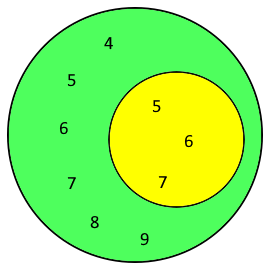Set Complement
Calculator for computing set complements with comprehensive formulas and examples
Set Complement Calculator
What is calculated?
The complement of set A with respect to a universal set U contains all elements of U that are not in A. Notation: Ac or Ā or U \ A.
Complement Info
Properties
Complement Ac:
- Ac = U \ A (Difference to universal set)
- A ∪ Ac = U (Union equals U)
- A ∩ Ac = ∅ (Intersection is empty)
- (Ac)c = A (Double complement)

Venn diagram of the complement
Memory aid: "The complement of A contains all elements of the universal set that are not in A."
Examples
U = {1,2,3,4,5}, A = {1,3}
Ac = {2,4,5}
∅c = U
Uc = ∅
Related Operations
|
|
Complement Formulas
Basic Definition
Set Difference
De Morgan 1
De Morgan 2
Double Complement
Complement Laws
Detailed Calculation Example
Example: A = {5,6,7}, U = {4,5,6,7,8,9}
Given:
- A = {5, 6, 7} (Subset)
- U = {4, 5, 6, 7, 8, 9} (Universal set)
Step 1 - Verification:
Step 2 - Determine complement:
Step 3 - Result:
Interpretation: The complement of A with respect to U contains the elements 4, 8, 9, which are in the universal set but not in A.
Practical Application Example
Example: Students in a class and elective courses
All students in the class (U):
Anna, Ben, Clara, David, Eva, Franz, Greta, Hans, Ina, Jörg
French course participants (A):
Clara, David, Eva, Hans
Question: Which students are NOT taking the French course?
Result: 6 out of 10 students are not taking the French course.
De Morgan's Laws
The fundamental laws of set theory
First Law
The complement of the union is the intersection of the complements
Second Law
The complement of the intersection is the union of the complements
Practical Example
Given: U = {1,2,3,4,5,6}, A = {1,2,3}, B = {3,4,5}
A ∪ B = {1,2,3,4,5}
(A ∪ B)c = {6}
Ac = {4,5,6}, Bc = {1,2,6}
Ac ∩ Bc = {6} ✓
A ∩ B = {3}
(A ∩ B)c = {1,2,4,5,6}
Ac ∪ Bc = {1,2,4,5,6} ✓
Mathematical Properties
Basic Properties
- Involution: (Ac)c = A
- Complementarity: A ∪ Ac = U
- Disjointness: A ∩ Ac = ∅
- Uniqueness: Ac is uniquely determined
Special Cases
- Empty set: ∅c = U
- Universal set: Uc = ∅
- Subsets: If A ⊆ B, then Bc ⊆ Ac
- Cardinality: |Ac| = |U| - |A|
Important Notes
Consider universal set: The complement is always relative to the chosen universal set
Subset property: A must be a subset of U
Practical Applications
Computer Science
- Boolean algebra
- Logical operations
- Database queries (NOT)
- Bit manipulation
Statistics
- Complementary events
- Probability theory
- Opposite events
- Exclusion methods
Administration
- Exclusion lists
- Identify non-participants
- Find missing elements
- Categorization
|
|